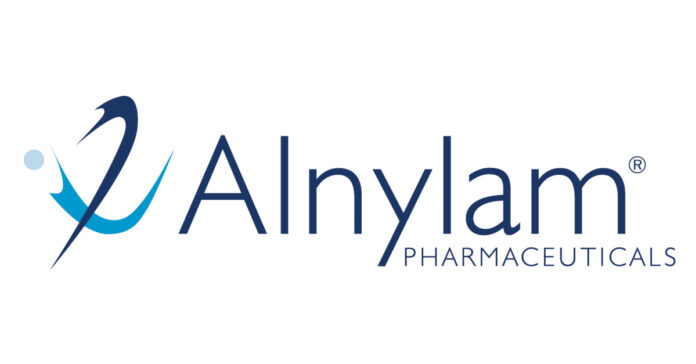CAMBRIDGE, Mass.– Alnylam Pharmaceuticals, Inc. (Nasdaq: ALNY), the leading RNAi therapeutics company, today announced that the APOLLO-B Phase 3 study of patisiran, an investigational RNAi therapeutic in development for the treatment of transthyretin-mediated (ATTR) amyloidosis with cardiomyopathy, met the primary endpoint of change from baseline in the 6-Minute Walk Test (6-MWT) at 12 months compared to placebo (p-value 0.0162). The study also met the first secondary endpoint of change from baseline in quality of life compared to placebo, as measured by the Kansas City Cardiomyopathy Questionnaire (KCCQ) (p-value 0.0397).
The study also included additional secondary composite outcome endpoints to be tested in a hierarchical manner. A non-significant result (p-value 0.0574) was found on the secondary composite endpoint of all-cause mortality, frequency of cardiovascular events, and change from baseline in 6-MWT over 12 months compared to placebo. As a result, formal statistical testing was not performed on the final two composite endpoints, which were not powered for statistical significance given the short duration of the study — all-cause mortality and frequency of all-cause hospitalizations and urgent heart failure visits in patients not on tafamidis at baseline (nominal p-value 0.9888), and in the overall population (nominal p-value 0.5609). Patisiran also demonstrated an encouraging safety and tolerability profile, with deaths numerically favoring the patisiran arm.
“We are thrilled that APOLLO-B successfully met all its major objectives, which we believe for the first time validates the hypothesis that TTR silencing by an RNAi therapeutic can be an effective approach for treating the cardiomyopathy of ATTR amyloidosis,” said Pushkal Garg, M.D., Chief Medical Officer of Alnylam. “ATTR amyloidosis with cardiomyopathy is an increasingly recognized cause of heart failure, affecting greater than 250,000 patients around the world. These patients have limited treatment options, and disease progression is common. As such, we are encouraged to see the potential of patisiran to improve the functional capacity and quality of life of patients living with this fatal, multi-system disease. I want to thank all the patients, caregivers, investigators, and study staff who have and continue to participate in APOLLO-B. We look forward to sharing full results at an upcoming conference in September, and based on these positive results, we plan to submit a supplemental NDA for patisiran with the U.S. Food and Drug Administration in late 2022.”
APOLLO-B is a Phase 3, randomized, double-blind, placebo-controlled multicenter global study designed and powered to evaluate the effects of patisiran on functional capacity and quality of life in patients with ATTR amyloidosis with cardiomyopathy. The study enrolled 360 adult patients with ATTR amyloidosis (hereditary or wild-type) with cardiomyopathy at 69 sites in 21 countries. Patients were randomized 1:1 to receive 0.3 mg/kg of patisiran or placebo intravenously administered every three weeks over a 12-month double-blind treatment period. After 12 months, all patients will receive patisiran in an open-label extension period.



